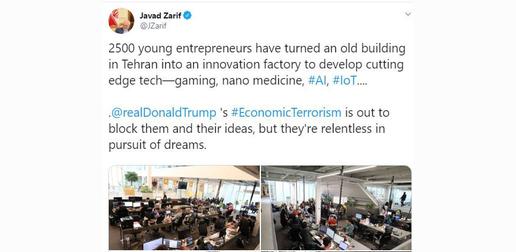After visiting a startup in Tehran on October 21, Iranian Foreign Minister Mohammad Javad Zarif tweeted that “2500 young entrepreneurs have turned an old building in Tehran into an innovation factory to develop cutting edge tech,” adding that Trump’s “economic terrorism” is out to block them and their ideas but “they're relentless in pursuit of [their] dreams.”
According to the Iran Front Page website, the startup, Azadi Innovation Factory, “has been set up to facilitate the entrepreneurial teams’ access to the necessary infrastructure and facilities, to create synergy among the startups, and to encourage innovation and creativity in a dynamic atmosphere.”
During his visit, Zarif said that, under the second administration of President Rouhani, “the Ministry of Foreign Affairs has set two super priorities: the regional issues, and the subject of resistance economy and economic diplomacy... The best destination for the Islamic Republic of Iran’s exports is the region.” He expressed hope that “the administration could remove the obstacles that the cruel American sanctions have put in the way of these young people."
A few months after President Rouhani was inaugurated for a second term in 2017 and when international sanctions on Iran had been lifted following the implementation of the JCPOA (the Joint Comprehensive Plan of Action, as the nuclear agreement is officially called), the government launched a campaign to attract foreign capital and to open the Iranian economy to international cooperation. But months earlier, even before the campaign started, opponents of Rouhani’s administration seized on statements by the Supreme Leader Ayatollah Khamenei about the Americans’ “infiltration project” through the JCPOA and sabotaged Iran’s business prospects by arresting businessmen who were interested in improving Iran’s ties to the international economy, and bringing trumped-up charges against them.
During this period, when the US had not yet left the JCPOA, the Iranian foreign ministry created an Office of Economic Diplomacy to encourage and facilitate foreign investment in Iran. With the creation of this office, Gholamreza Ansari, then Iran’s ambassador to India, was appointed Deputy Foreign Minister for Economic Diplomacy but, after nearly three years, he has not much to show for his work.
It is true that soon enough after his election President Trump fulfilled his promise to pull the US out of the JCPOA, re-imposed the old sanctions on Iran and added new ones, but even before that Zarif’s Office of Economic Diplomacy had failed in its mission to expand Iran’s commercial relations with the international community by grasping the opportunity provided by the JCPOA. And, of course, things did not improve afterwards.
“Just talk”
“At this moment Iran faces economic challenges in the areas of sanctions and oil exports but both the evidence and the appearances show that the Foreign Ministry’s Office of Economic Diplomacy has practically done nothing in this area and, perhaps, we can say that this office has remained at the level of just talk,” an article published on the website Alef said on July 11, 2018, before US sanctions were re-imposed [Persian link]. The website was launched by Ahmad Tavakoli, a conservative politician and journalist who is considered to be “friendly” to Rouhani’s administration.
However, the Rouhani government’s inability and failure — and particularly that of the foreign ministry — to promote and facilitate Iran’s commercial ties is not limited to challenges resulting from American sanctions. Recently, Keyvan Kashefi, a member of Iran’s Chamber of Commerce and the head of the Iran-Syria Commercial Commission, criticized the weak economic diplomacy of the Rouhani administration, and pointed out that Iran does not even have a commercial attaché in Syria.
Iran has been the biggest supporter of Syrian president Bashar al-Assad during Syria’s devastating civil war and, by sending its military to that country, has paid a heavy cost. According to Kashefi, “Iran paid for the main cost of the Syrian war but it is the United Arab Emirates and China that are reaping the economic benefits in Syria.”
Perhaps Rouhani’s administration, for whatever reason, is unable or unmotivated or cannot compete against powerful rivals such as the Revolutionary Guards, but no excuse can justify failing to appoint even a commercial attaché to Syria. Both the government and the foreign ministry of the Islamic Republic continuously blame American sanctions for all the country’s economic ills and for the lack of progress and declare that nothing can be done — not even for a startup — until “the obstacles that the cruel American sanctions have put in the way of these young people” have been removed.
Related Coverage:
All Is Well — Except that We’re Poor and the Economy Is Bankrupt, October 22, 2019
Iran’s Shrinking Economy, October 21, 2019
Iran Joins Eurasian Economic Union to Combat US Sanctions, October 14, 2019
Employment Figures for Summer 2019: Has it Really Improved?, October 11, 2019
Is There any Hope of Reining in Iran's Runaway Inflation?, May 24, 2019
This Year 57 Million Iranians Will Be Living Below the Poverty Line, May 15, 2019
A Bleak Future for Iran's Job Market, May 3, 2019
Decline in Investment Across Iran After US Exit from the Nuclear Deal, April 27, 2019
visit the accountability section
In this section of Iran Wire, you can contact the officials and launch your campaign for various problems





















comments